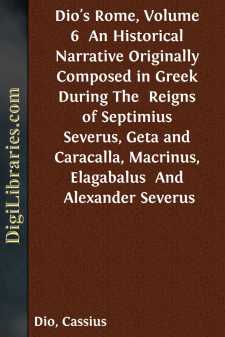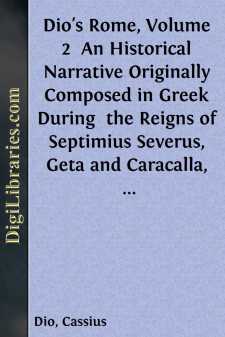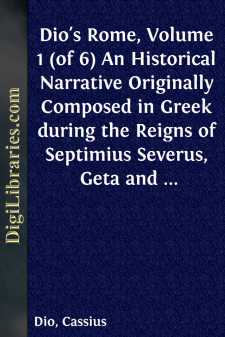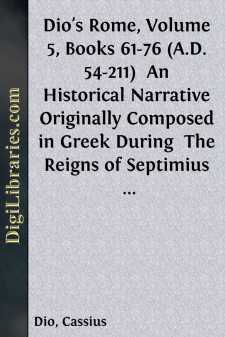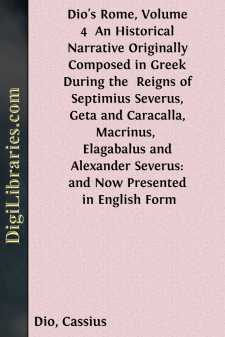Categories
- Antiques & Collectibles 13
- Architecture 36
- Art 48
- Bibles 22
- Biography & Autobiography 813
- Body, Mind & Spirit 142
- Business & Economics 28
- Children's Books 17
- Children's Fiction 14
- Computers 4
- Cooking 94
- Crafts & Hobbies 4
- Drama 346
- Education 46
- Family & Relationships 57
- Fiction 11829
- Games 19
- Gardening 17
- Health & Fitness 34
- History 1377
- House & Home 1
- Humor 147
- Juvenile Fiction 1873
- Juvenile Nonfiction 202
- Language Arts & Disciplines 88
- Law 16
- Literary Collections 686
- Literary Criticism 179
- Mathematics 13
- Medical 41
- Music 40
- Nature 179
- Non-Classifiable 1768
- Performing Arts 7
- Periodicals 1453
- Philosophy 64
- Photography 2
- Poetry 896
- Political Science 203
- Psychology 42
- Reference 154
- Religion 513
- Science 126
- Self-Help 84
- Social Science 81
- Sports & Recreation 34
- Study Aids 3
- Technology & Engineering 59
- Transportation 23
- Travel 463
- True Crime 29
Dio's Rome, Volume 6 An Historical Narrative Originally Composed in Greek During The Reigns of Septimius Severus, Geta and Caracalla, Macrinus, Elagabalus And Alexander Severus
by: Cassius Dio
Description:
Excerpt
BOOK 78, BOISSEVAIN.)
[Sidenote: A.D. 211 (a.u. 964)] [Sidenote:—1—] After this Antoninus secured the entire power. Nominally he ruled with his brother, but in reality alone and at once. With the enemy he came to terms, withdrew from their country, and abandoned the forts. But his own people he either dismissed (as Papinianus the prefect) or else killed (as Euodus, his nurse, Castor, and his wife Plautilla, and the latter's brother Plautius). In Rome itself he also executed a man who was renowned for no other reason than his profession, which made him very conspicuous. This was Euprepes, the charioteer; he killed him when the man dared to show enthusiasm for a cause that the emperor opposed. So Euprepes died in old age after having been crowned in an endless number of horse-races. He had won seven hundred and eighty-two of them,—a record equaled by none other.
Antoninus had first had the desire to murder his brother while his father was still alive, but had been unable to do so at that time because of Severus, or later, on the road, because of the legions. The men felt very kindly toward the younger son, especially because in appearance he was the very image of his father. But when Antoninus arrived in Rome, he got rid of this rival also. The two pretended to love and commend each other, but their actions proved quite the reverse to be true, and anybody could see that some catastrophe would result from their relations. This fact was recognized even prior to their reaching Rome. When it had been voted by the senate to sacrifice in behalf of their harmony both to the other gods and to Harmony herself, the assistants made ready a victim to be sacrificed to Harmony and the consul arrived to do the slaughtering; yet he could not find them, nor could the assistants find the consul. They spent nearly the whole night looking for each other, so that the sacrifice could not be performed on that occasion. The next day two wolves climbed the Capitol, but were chased away from that region: one of them was next encountered somewhere in the Forum, and the other was later slain outside the pomerium. This is the story about those two animals.
[Sidenote:—2—-] It was Antoninus's wish to murder his brother at the Saturnalia, but he was not able to carry out his intention. The danger had already grown too evident to be concealed. As a consequence, there were many violent meetings between the two,—both feeling that they were being plotted against,—and many precautionary measures were taken on both sides. As many soldiers and athletes, abroad and at home, day and night, were guarding Geta, Antoninus persuaded his mother to send for him and his brother and have them come along to her house with a view to being reconciled. Geta without distrust went in with him. When they were well inside, some centurions suborned by Antoninus rushed in a body. Geta on seeing them had run to his mother, and as he hung upon her neck and clung to her bosom and breasts he was cut down, bewailing his fate and crying out: "Mother that bore me, mother that bore me, help!...


